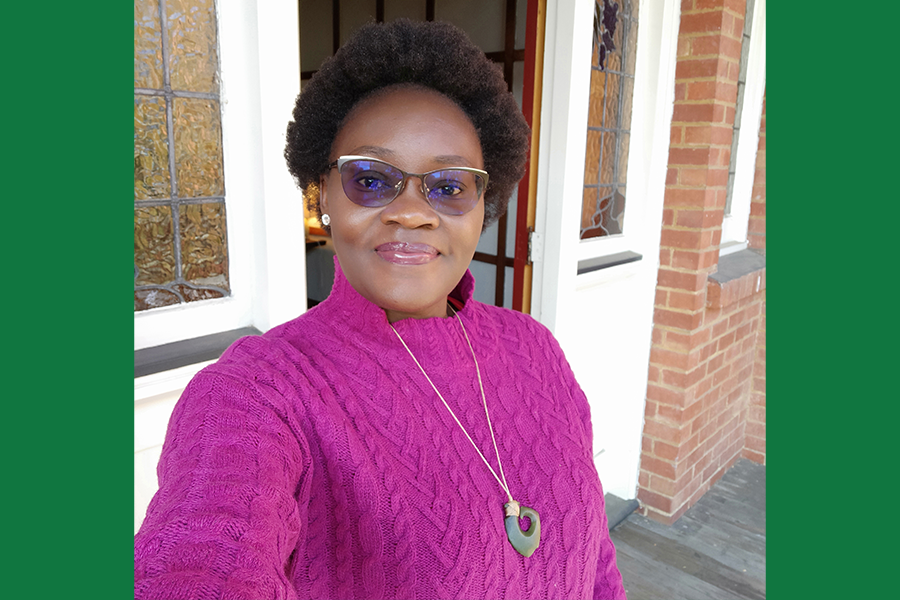
PhD candidate Shirley Achieng' says her thesis gaining Exceptional Thesis status is not just a win for her, but a win for Kenya, too.
A thesis challenging the traditional western approach to counterterrorism has been awarded Exceptional Thesis status for the Humanities Division.
PhD candidate Shirley Achieng’ completed her PhD through the Te Ao o Rongomaraeroa | National Centre for Peace and Conflict Studies. Her thesis is titled: Towards an indigenous African approach to counterterrorism in Kenya.
Shirley says her Exceptional Thesis is not just a win for her, but for Kenya, as well.
Shirley believes fate played a role in bringing her from Kenya to Otago - her grandfather saw an ad in a daily Kenyan newspaper for New Zealand Government scholarships and suggested she apply, as he knew she wanted to undertake a PhD in Peace and Conflict studies.
“After a rigorous process that took about eight months, I was awarded the scholarship”.
“To be honest, before then, the only thing I knew about New Zealand was the rugby because Kenya has a vibrant and successful rugby team as well.”
As her thesis topic was on terrorism, she was drawn to Professor Richard Jackson’s work.
“I saw myself getting the best out of my academic journey, and I think I did.”
Shirley was based on Otago’s Ōtepoti Dunedin campus for the duration of her PhD.
“I have to say, studying in Dunedin was one of the best moments of my life.”
She found the people to be kind, helpful and pleasant. The University’s environment was always calm, safe, and peaceful. She never had to worry about working late because Campus Watch helped her get home.
Shirley says her thesis demonstrates the need to shift from the dominant, traditional understanding of terrorism and counterterrorism, and advocates for the adoption of local ways of dealing with terrorism in Kenya.
“That is positioning Africa as a producer rather than merely a consumer of counterterrorism knowledge.”
“Accordingly, the thesis challenges Kenya’s overdependency on Western counterterrorism strategies which are state-centric, military-based and embedded in colonial narratives,” she says.
“It debunks the misconception that there is no such thing as an Indigenous understanding of counterterrorism and that Indigenous people are incapable of scientific inquiry.”
The thesis proposes an original framework to countering terrorism known as the Usalamautu counterterrorism framework, which is based on the African personality and values.
She would like to see the topic broached by “multiple vibrant dialogues” to provide counternarratives to dominant Global War on Terror strategies which continue to marginalise and exclude alternative ways of dealing with terrorism.
Her work is important because it positions Africa as a subject, rather than an object of history, and as a place capable of producing solutions, she says.
Shirley would like to see her research outcomes applied in counterterrorism policy and practice, especially by governments in the global South.
“The current Global War on Terror Strategy that is being applied wholesale, is not working for states that have a colonial history, neither is it in sync with the way of life of the indigenous population.”
When Shirley found out her thesis had been granted Exceptional Thesis status, she thought her eyes were deceiving her.
“I woke up to several emails congratulating me and I thought my eyes were playing tricks on me to be honest,” Shirley says.
“It felt so humbling to know that my thesis had been found to be impactful and of value.”
Shirely handed her thesis in last August and will graduate in May.
Shirley is now working for the Kenya Government and has also founded a Decolonial Terrorism Studies Network which comprises scholars from the global South.
“This will involve publishing articles and organising conferences around the world.”
Eventually, Shirley would like to follow her passion of getting into academia and pursuing a postdoctoral fellowship.
“We aim to shift the counterterrorism narrative towards indigenous approaches by advocating for local solutions to the terrorism problem.”
She plans on returning to Ōtepoti for graduation in May.
-Korero by internal communications advisor, Koren Allpress